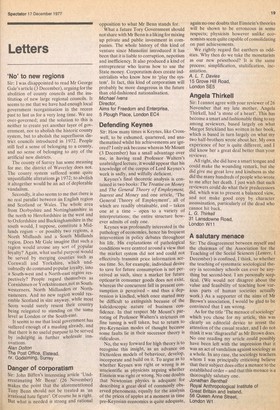Defending Keynes
Sir; How many times is Keynes, like Cromwell, to be exhumed, quartered, and anathematised whilst his achievements are ignored? I only ask because whereas Mr Mount (3 December) has a small advantage over me, in having read Professor Walters's unabridged lecture, it would appear that his knowledge of the corpus of Lord Keynes's work is sadly, and wilfully deficient.
Keynes's final theoretic analysis is contained in two books: The Treatise on Money and The General Theory of Employment, interest and Money and one article, 'The General Theory of Employment', all of which are readily obtainable, and — taken one at a time — open to a variety of interpretations; the entire structure however admits of only one.
Keynes was profoundly interested in the pathology of economies, hence his frequent intervention in policy debates throughout his life. His explanations of pathological conditions were centred around a view that the market system did not and could not effectively transmit price information across time. So, for example, individual desire to save for future consumption is not perceived as such, since a market for future optionrin consumer goods does not exist, whereas the concurrent fall in present consumption is perceived — and thus a depression is kindled, which once started may be difficult to extinguish because of the kaleidoscopic nature of business confidence. In that respect Mr Mount's parroting of Professor Walters's strictures on fine tuning is well taken, but to return to pre-Keynesian modes of thought because some faults lie in their successor theory is ridiculous.
No, the way forward for high theory is to recognise this insight, as an advance on frictionless models of behaviour, develop, incorporate and build on it. To argue as to whether Keynes was right or wrong is as unscientific as physicists arguing whether Einstein was right or wrong. No one doubts that Newtonian physics is adequate for describing a great 'deal of commonly observed phenomena, equally for the analysis of the prices of apples at a moment in time pre-Keynsian economics is quite adequate, again no one doubts that Einstein's theories will be shown to be erroneous in some respects; physicists however unlike economists seem quite capable of consolidating on past achievements, We rightly regard flat earthers as oddities. Why then do we take the monetarists as our new priesthood? It is the same process; simplification, stultification, incantation.
A. L. 7'. Davies 15 Grove Hill Road, London SE5


































 Previous page
Previous page